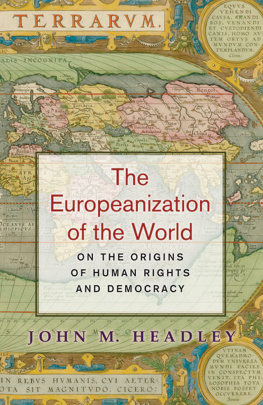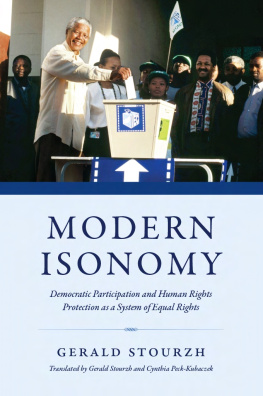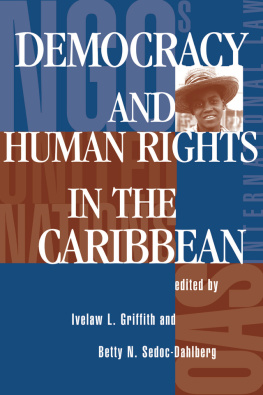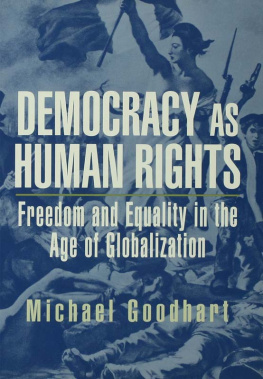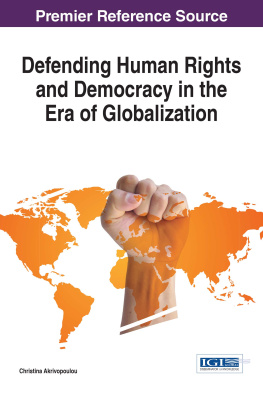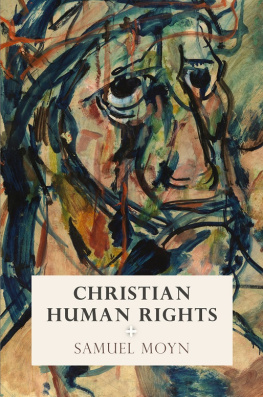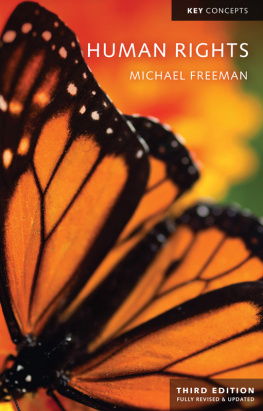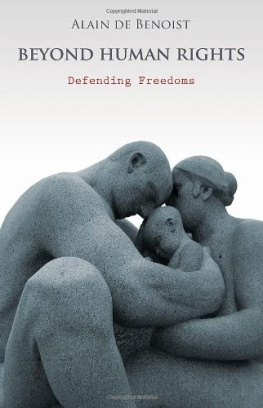
The Europeanization of the World
The Europeanization of the World
On the Origins of Human Rights and Democracy
JOHN M. HEADLEY
PRINCETON UNIVERSITY PRESS
PRINCETON AND OXFORD
Copyright 2008 by Princeton University Press
Published by Princeton University Press, 41 William Street,
Princeton, New Jersey 08540
In the United Kingdom: Princeton University Press, 3 Market Place,
Woodstock, Oxfordshire OX20 1SY
All Rights Reserved
Library of Congress Cataloging-in-Publication Data
Headley, John M.
The Europeanization of the world : on the origins of human rights and democracy / John M. Headley
p.cm.
Includes bibliographical references and index.
ISBN: 978-0-691-13312-6 (hardcover : alk. paper)
1. Democracy. 2. Human rights. 3. GlobalizationPolitical aspects. I. Title.
JC423.H425 2007
321.8dc222007010470
British Library Cataloging-in-Publication Data is available
This book has been composed in Palatino
Printed on acid-free paper.
press.princeton.edu
Printed in the United States of America
1 3 5 7 9 10 8 6 4 2
Remota itaque iustitia, quid sunt regna nisi
magna latrocinia?
Aug. De civ. Dei, IV.4
For my many grandnieces
and grandnephews
and for their generation,
lest they ignore, forget,
or never even encounter
Contents
Illustrations
Preface
F or the reader, the preface, coming first in a book, can convey the impression that the work developed logically from a reasonable beginning. For the author, however, the preface comes last and compels its writer to perceive and admit the stumblings and false starts, his doubts and debts along the way. In the present instance the experience of writing this book, its composition, stems from a remote corner of the historical profession, on the part of one who early felt dissatisfaction with the all too easy orientation of our history toward the nation-state and its almost preordained beginnings; on the part of one who looked to other forms of polity and human political organization in the historical record for transcending such parochialism or at least making it more historically bound: first the church in its potential universality, then empireperhaps more Spanish and Spanish colonial than Holy Roman, but still never too far removed from the wondrously archaic features of the Germanic experience. My first discernible, specific debt I owe to long acquaintance with Tommaso Campanella, that notorious seventeenth-century Dominican prisoner, with his marvelously Italianate drive toward the global, the universal, and the transformation of the world. Following an extended study of this radical prophet, I awakened from my own thoughts to discover that the world around me had meanwhile become transformed by a new sort of universality, by global processes, producing that seemingly unaccountable realityglobalizationwhich now commands our attention. I could not help but recognize that this entity, good or bad, was very much the result of that civilization of which I am a product, and which I have respected and have made such long effort to study, explore, understand.
In the preparation of this book I have incurred a legion of debts toward friends and associates from whom I have received advice, suggestions, comfort, reassurance, and the reading of individual parts: Jerry Bentley, Melissa Bullard, Ian Crowe, Susan Danforth, Anne D. Hall, Peter Headley, Don Higginbotham, Hans J. Hillerbrand, Peter I. Kaufman, Timothy Kircher, Lloyd Kramer, D.W.Y. Kwok, Hsi Huey Liang, Michael Lienesch, Bruce Mazlish, Terence McIntosh, Michael McVaugh, Kenneth Nebenzahl, Gerda Nischan, Barbara Norton, Anthony Papalas, Robert Policelli, Gerald Postema, Celia Pratt, Paul Rahe, Jonathan Reid, Jay Smith, Maria Smith, John Sweet, John B. Tomaro, Keith Windschuttle, Ronald Witt, Jessica Wolfe, and T. C. Price Zimmermann.
Some persons deserve special mention: Price Zimmermann for his unsurpassed weighing of words in two crucial sections; Paul Rahe for his careful, appreciative reading of the entirety, his valuable suggestions, and his decisive support; Robert Policelli for his reliable and prompt expedition; Barbara Norton for sustained advice and aid in the preparation and assemblage of the manuscript; Celia Pratt of the University of North Carolina at Chapel Hill map division, and Susan Danforth, curator of Maps and Prints, John Carter Brown Library, for their ready assistance with the illustrations. As the present work concerns the beginnings of globalization, the maturing of civilizations and the larger, long-range principles of human history, I was fortunate, even at the late stage of submission to the Press, that by serendipity, following a thirty-year lapse, I renewed an association with one of the principal pioneers in the study of globalization, Bruce Mazlish. Professor Mazlish generously apprised me of his own most recent workCivilization and Its Contents (2004) and The New Global History (2006), published the week before I made my own submission. Both Mazlishs books have relevance for the larger implications of my present work, although such implications are not made evident in the body of the work. From the first I found most fruitful Mazlishs willingness to consider the need to divest ourselves henceforth of thinking in terms of civilizations, especially given the pressures and the concept and reality of globalization. Second, in consulting earlier drafts of parts of the forthcoming New Global History, I considered valuable his addressing the need for a higher morality created by the increasing evidence of globalization. The idea allowed me to see in a new light the role of my second principle examined at length herethat of political dissentinsofar as it may relate to my first principle, the equalizing dynamic in the idea of a common humanity: not necessarily a higher morality but one distinguished by tolerance, compromise, moderation, even playfulness and humor. With the West still the principal agent in pushing an assemblage of diverse cultures toward a new, globalized way of life, Indian civilization might prove the most receptive, given its British phase and preparation; China less readily compliant, given its long understanding of itself as the Middle Kingdom to which all other polities and peoples must be subservient; and Islam, unique in its totally circumscribed religious wrappings, recently reinforced by conflict, inherently the least susceptible and the most resistant.
Among other forms of indebtedness and obligation, I wish to acknowledge the many services extended to me by both the personnel of Davis Library and the History Department of the University of North Carolina at Chapel Hill. Finally, by no means least, I am glad to recognize the support and understanding, evident at crucial stages of the manuscripts odyssey, of Brigitta van Rheinberg, now the editor-in-chief at Princeton University Press.
have been based upon previous articles and publications that in this instance have been reshaped and to which evidence has been added for the larger context of this book. In this respect I want to thank the Journal of World History for allowing me to draw heavily upon The Sixteenth-Century Venetian Celebration of the Earths Total Habitability: The Issue of the Fully Habitable World for Renaissance Europe, vol. 8, no. 1 (1997): 127, and The Universalizing Principle and Process: On the Wests Intrinsic Commitment to a Global Context, vol. 13, no. 2 (2002): 291321; likewise
Next page
